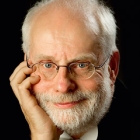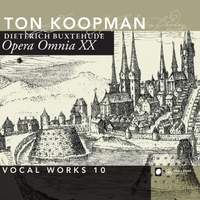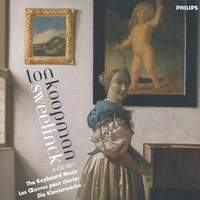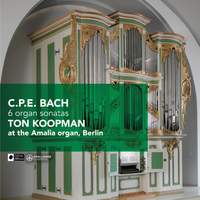Interview,
Ton Koopman at 70
 The Dutch keyboardist Ton Koopman is a long-standing veteran of the early music movement, in which he has been influential throughout his career both as an academic and as a performer. In recent years his main focus has been on the Opera Omnia project, an ambitious and unprecedented bid to record the complete works of the Danish-German composer Dieterich Buxtehude, a forerunner of JS Bach.
The Dutch keyboardist Ton Koopman is a long-standing veteran of the early music movement, in which he has been influential throughout his career both as an academic and as a performer. In recent years his main focus has been on the Opera Omnia project, an ambitious and unprecedented bid to record the complete works of the Danish-German composer Dieterich Buxtehude, a forerunner of JS Bach.
This project has now reached its completion with the release of both the final volume of vocal works and the box-set of the full project. It's a fitting (if slightly belated) birthday present for a man who turned seventy in October this year; Dr Koopman was kind enough to chat to me over the phone about this project, his long and distinguished career, and more.
... and the whole Opera Omnia series, as well as Koopman's Bach Cantata project and much more, are currently included in our special offer on the entire Challenge Classics label!
Your style of playing Buxtehude is quite different to many other versions out there; much more virtuosic in many ways. Is this simply down to the way you feel the music should be played, or is it an academic decision based on study of the source material?
This isn't my private idea – Buxtehude himself referred to the organ as his "theatre", and his music embraces the stylus fantasticus – the Italian-inspired school of music that came via composers such as Frescobaldi and Froberger, which is really music to amaze. The whole point of this style is that there should be as as much variety as possible – as fast, as slow as possible. The sources corroborate this, and it's the key to Buxtehude's keyboard works – they are intended to be very flashy!
There’s a big disparity between the reputations enjoyed today by Bach and Buxtehude. Why do you think Bach, out of all the many composers of the German Baroque, has come to be so venerated, and do you think Buxtehude suffers from being in his shadow?
There are two parts to the answer to this question. The first is that around 1900, German musicologists imposed the distinction between "great masters" (Bach, Handel, Schütz) and "small masters" – this was a great mistake!
But... for me, no composer at all is equal to Bach. Not even Mozart! I think composers can maybe be next to him, but not equal – in Bach's time, comparisons were drawn between the best Buxtehude and Bach's own writing.
The difference is that Bach's music works on any instruments, for any forces – even on a street organ! Buxtehude, Couperin etc – these composers' music doesn't work on a street organ. But at the same time, Buxtehude created a new style, with newly improvisatory techniques. And as we know, Bach studied Buxtehude's music in some detail, copying out some of his chorales. At Buxtehude's Abendmusik recitals in Lübeck, the young Bach was invited to play. He was no longer a student – at twenty years old, he was his own man. But Buxtehude encouraged him because he saw the potential in him as a musician, and this allowed Bach to look at Buxtehude's style. Indeed, what he learned got him into some trouble when he returned home, bringing the new and unfamiliar harmonies with him!
Perhaps a predictable (and impossible to answer!) question – what would you say has been the highlight of your career so far?
I really have no idea... I like everything! In 1991 I did all the Mozart symphonies, and that was a highlight; then all the Bach cantatas, and of course that was a huge highlight; and now all the Buxtehude is another highlight! I'm proud to have got through it in what is a difficult time for the CD industry, and I hope it introduces more people to the variety in his music. There is a cantata with a depiction of a drunken piper... there's the very public Lübeck Abendmusik but also some works for a much more private setting that are much more improvisatory – which made them almost impossible to record and edit, because each take would be so different!
You’ve been one of the trailblazers of the “authentic performance” movement, which has done an incredible amount to reinvigorate our understanding of Baroque and Renaissance music. Where do you see this movement going in the future? Is it essentially “mission accomplished” now that historically-informed performance practice has become commonplace, or is there more work to be done?
Oh, there's much more work still to be done. The first generation laid the foundations of research but the next generation need to continue and challenge these. To take an example: Trills. I don't always follow what the treatises say when I play trills, and maybe some people will hear this and say 'aha, Ton Koopman is wrong' because of it... but our understanding is still very far from complete. These days the internet and email make this so much easier – one is not restricted just to old libraries.
Or to take another example – the fermata in Bach's chorales. [Nikolaus] Harnoncourt's initial ideas were initially adopted and followed, but we need to look at more sources, for instance church songbooks. Is the fermata even to do with note length at all in this context? I think maybe it just marks the start of a new line, perhaps with a short interlude. Again, more research is needed.
And the use of A=415 for Baroque performance – again, maybe this was a wrong decision! We need to look at A=409, A=412. Our initial assumptions have been carried on without re-examination.
In a related vein… given that you’ve now committed complete sets of both Bach and Buxtehude to disc, where do you go from here? What future projects do you have in mind – some Spanish Baroque music, perhaps?
I have many beautiful ideas – the problem is finding the money! Yes, this is the big problem. We need a complete Haydn on historical instruments... and I want to look at Lassus's Psalmi Davidis poenitentiales, and Monteverdi, and some Purcell... I hope for a generous benefactor to make it possible! There is much less money in the music industry than there used to be. We're lacking people who will help to fund these recordings purely for the love of it.
The final volume in the Opera Omnia series, this completes the set of his vocal works and thus the entire cycle. Released 10 November.
Available Formats: 2 CDs, MP3, FLAC
Other recordings by Ton Koopman
A selection of keyboard works by the late Renaissance composer Jan Pieterszoon Sweelinck, from Koopman's native Netherlands.
Available Formats: MP3, FLAC
The six organ sonatas of CPE Bach form the core of the surviving body of his organ output. Koopman plays the Amalia organ in the church Zur frohen Botschaft in Berlin.
Available Formats: CD, MP3, FLAC





